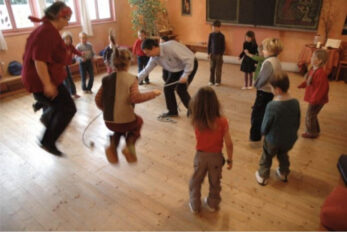
Information about the „Freie Waldorfschule Graz“

The “Freie Waldorfschule Graz” was founded by parents and teachers more than 40 years ago and is part of the worldwide Waldorf/Steiner-School association. FWS Graz is a general education comprehensive school with about 270 pupils and about 45 teachers and covers classes 1 to 12. The actual Waldorf curriculum is based on the principles of Steiner ́s pedagogical guidelines. It gives equal attention to the physical, emotional, intellectual,cultural and spiritual needs of each pupil and is designed to work in harmony with the different phases of the child’s development. Focus is laid on artistic lessons like music, art, drama theatre and craft-based subjects as stone- and woodwork, tailoring, forging, weaving etc. This kind of education enables students to think and act independently with great interest in progress and development of culture and society.

On our extensive school grounds, there are several school buildings as well as a kindergarten and a crèche. Artistic handicraft lessons are a main focus of the school, so there are workshops such as a blacksmith’s shop, a carpentry workshop, rooms for sewing and weaving and a sculptor’s studio on the premises. There are plenty of open spaces to play in the breaks and in the afternoon during after-school care, a sports field and a large school garden with vegetable beds and chickens. The school’s own kitchen cooks with fresh ingredients – partly from the school garden – for the pupils, teachers, kindergarten and after-school care. Parents are also welcome for lunch.
Our co-ed classes have about 25 children, though for some lessons (music, handcraft, gymnastics, foreign languages) they are divided into two groups. School starts at 8am and finishes at midday for classes 1 to 3. In classes 4 and above the lessons last longer, ending at 1:30pm for class 5, while the upper classes also have afternoon lessons.
Every class has a class teacher, who stays with the class for 8 years. Classes 9 to 12 have tutors for organisational matters and problem-solving. The first two hours of the school day are devoted to the main lessons, taken in blocks of 3 to 4 weeks. The main topics are mathematics, writing, German, history, and science. This is followed by special topic lessons such as foreign languages, handcraft, sports, music, religion, eurythmy, arts, gardening, literature etc.


Years ago, our school has introduced the so called “Moving classroom” as an increasing number of children showed a lack of physical mobility. A key reason for this is the living circumstance of many children, as families in the city often live in relatively small flats with no garden. Furthermore, many children are immobile while watching TV or using electronic devices. Teachers recognised that many children have difficulties balancing and climbing. To counter this, the concept of the “moving classroom” promotes mobility. There are no desks and chairs in the mobile classroom but rather low benches with cushions to sit on while writing or drawing. These are easy to clear away to create space for balancing, jumping rope and movement games. Support teachers assist children with learning difficulties or social problems in special lessons.
Throughout the year there are various annual celebrations. Before Christmas comes a bazaar with books, handcrafts, workshops for the children, tea-rooms and cafes. In summer, a festival is held with music, plays and dance.

On St. Michael’s day the children of class 11 build a big paper dragon, which is shot with bows and arrows by the children of class 5. There are also games and activities through which all children can test their courage.
The school also places much emphasis on drama theatre and music. In grade 6 children rehearse a music project, grade 8 presents a classical play, grade 10 creates a musical, grade 11 a foreign language theatre play (English or Italian), while grade 12 farewells the school with a play. Slightly older students go on hikes in the mountains and cycling tours to neighbouring countries.

The upper school curriculum (9-12) provides for various internships. In grade 9, a 3-week agricultural internship is completed on a farm in Austria or abroad. In grade 10, the
class completes a 2-week surveying internship together and goes on an art history trip, preferably to Italy. In the last 5 weeks of the 11th grade, each student works in a company – preferably abroad – to get a first impression of the working world. The last work experience is a social placement in grade 12, where the students work in a social institution, for example for elderly or disabled people. This internship can also take place abroad. For all internships abroad there is the possibility of financial support through the Erasmus+ School Education Project of the Austrian Waldorf Schools.


The Waldorf School concludes with artistic projects and a year’s work on a self-selected topic. Afterwards, the students can attend state school or evening school to obtain the higher education entrance qualification. Some students do a vocational training, whereby they are usually credited with 1 year.
The Waldorf School is a self-governing private school with public rights. It is administered jointly by teachers and parents. Almost 80% of the funding comes from the parents, whereby there is a social system in which the school fees are determined on the basis of income.